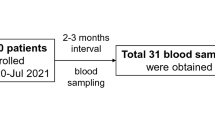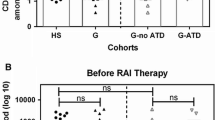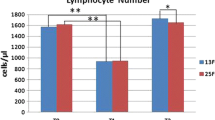Abstract.
This study evaluated changes in lymphocyte subsets in patients with thyroid carcinoma who received iodine-131 for diagnostic and therapeutic purposes. Twenty thyroid cancer patients were entered in the study after total thyroidectomy: ten patients (group A) underwent whole-body scintigraphy with 185 MBq of 131I and the other ten (group B) received 3700 MBq of 131I therapy. All patients were in a hypothyroid state at the time of administration of 131I and started l-thyroxine 150 µg/day 3 days after 131I administration. Free and bound triiodothyronine and thyroxine, thyroid-stimulating hormone, thyroglobulin, thyroglobulin antibodies, thyroid peroxidase/microsomal antibodies, white blood cell, lymphocyte counts and lymphocyte subsets were serially determined at baseline and at days 2, 7, 15, 30 and 60 after 131I administration. Twenty healthy age- and sex-matched individuals were used as a reference population for lymphocyte subset values. In group A only a reduction in NK cells at days 7 (P=0.043) and 15 (P=0.037) was observed. In group B, patients showed a delayed reduction in the total lymphocyte count at days 15, 30 and 60 (P=0.008, 0.004 and 0.018, respectively), and a decrease in B cells throughout the study (at days 7, 15, 30 and 60: P=0.006, 0.0017, 0.0017 and 0.0017 respectively). A transient decrease in NK cells was observed at days 15 (P=0.025) and 30 (P=0.008). Among T cells, the helper phenotype (CD4+) was mainly affected, resulting in a reduction in the CD4+/CD8+ ratio at day 60 (P=0.046). Comparing the two groups, the numbers of B lymphocytes at day 30 (P=0.023) and NK cells at days 2 (P=0.037) and 30 (P=0.023) were significantly lower in group B. Neither group showed any clinical sign of immunosuppression during the follow-up period. In patients with thyroid cancer the sensitivity of lymphocytes to the effects of 131I administered for diagnostic or therapeutic purposes depends upon lymphocyte phenotype and 131I activity. NK cells are the most radiosensitive cells, being reduced even by low 131I activity. At higher activity all subtypes show a reduction, which is more marked and prolonged for B lymphocytes and, to a lesser extent, for T-helper lymphocytes. These changes do not result in clinically relevant immunosuppression.
Similar content being viewed by others
Author information
Authors and Affiliations
Additional information
Received 6 March and in revised form 29 April 1999
Rights and permissions
About this article
Cite this article
Tofani, A., Sciuto, R., Cioffi, R. et al. Radioiodine-induced changes in lymphocyte subsets in patients with differentiated thyroid carcinoma. Eur J Nucl Med 26, 824–829 (1999). https://doi.org/10.1007/s002590050455
Issue Date:
DOI: https://doi.org/10.1007/s002590050455




